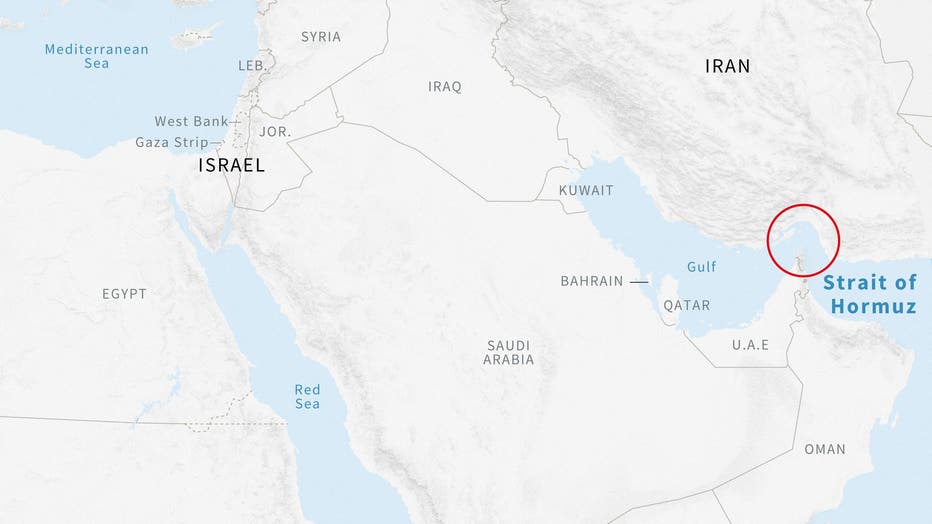
Iran threatens to shut down Strait of Hormuz
Iran has threatened before to close off the strait amid tensions with the U.S., and the disruption could be one way Iran retaliates after the U.S. bombed three of its nuclear sites on Saturday.
The world is anticipating what comes next after the U.S. inserted itself into the war between Israel and Iran Saturday with a surprise attack on three of Iran’s nuclear sites.
Many are suggesting that Iran’s next move could involve a disruption at the Strait of Hormuz, an international transit route.
Here’s what to know:
What is the Strait of Hormuz?

FILE – Infographic with a map of the Middle East showing the location of the Strait of Hormuz (Graphic by Jonathan Walter, Anibal Maiz Caceres/AFP via Getty Images)
On the map:
The Strait of Hormuz is the narrow mouth of the Persian Gulf that flows into the Gulf of Oman, where ships can then travel to the rest of the world.
The Strait is in the territorial waters of Iran and Oman.
By the numbers:
At its narrowest point, it is just 21 miles wide. The width of the shipping lane in either direction is only 2 miles wide.
RELATED: US bombs Iran latest: Iran’s nuclear ambitions ‘obliterated,’ Hegseth says
Key passage for oil
By the numbers:
Some 20% of all oil traded globally passes through the strait, according to The Associated Press.
Why you should care:
Anything affecting the strait ripples through global energy markets, raising the price of crude oil. That then trickles down to consumers through what they pay for gasoline and other oil products.
Oil prices have already increased as the war between Israel and Iran has intensified, climbing by 21% over the past month.
Has Iran closed the Strait of Hormuz?
The backstory:
Iran has threatened before to close off the strait amid tensions with the U.S., and the disruption could be one way Iran retaliates after the U.S. bombed three of its nuclear sites on Saturday.
Big picture view:
As of Sunday afternoon, several outlets had begun reporting that Iran’s parliament had endorsed closing off the passageway.
In a lesser move, Iran could cause a short-term blockage in the strait with its fleet of fast-attack boats and thousands of naval mines. It could also fire missiles from its long Persian Gulf shore.
Any blockage would surely cause a fast-moving response from the U.S., which has its superior 5th Fleet stationed nearby in Bahrain.
But even a relatively brief interruption could paralyze shipping traffic and spook investors, causing oil prices to spike and generating international pressure for a ceasefire.
Why did the US attack Iran?

U.S. bombs Iran nuclear sites
As tensions rise following U.S. military strikes on Iran’s nuclear sites, questions remain about how Iran may respond and what this means for regional stability. Alireza Jafarzadeh, author of “The Iran Threat,” joins LiveNOW from Fox’s Carel Lajara to discuss the latest developments and what could come next.
The backstory:
Airstrikes that began earlier this month by Israel targeted Iran’s nuclear facilities and generals, prompting retaliation from Iran and creating a series of events that contributed to the U.S. attack.
What they’re saying:
Defense Secretary Pete Hegseth said at a news conference that America “does not seek war” with Iran while Vice President JD Vance said the strikes have given Tehran the possibility of returning to negotiate with Washington.
RELATED: Read full remarks of what Trump said about bombing Iran

U.S. strikes on Iran: What negotiations look like going forward
On Saturday, President Donald Trump announced that the U.S. launched strikes against nuclear facilities in Iran. LiveNOW from FOX’s Carel Lajara spoke with Martin Latz, author of “The Real Trump Deal: An Eye-Opening Look at How he Really Negotiates,” to discuss what may come next as the Iranian foreign minister says diplomatic talks are off the table.
What’s next:
The Trump administration on Sunday signaled a willingness to renew talks with Iran and avoid a prolonged war.
RELATED: Who are Iran’s allies?
Meanwhile:
Iran criticized the actions as a violation of its sovereignty and international law.
Iran’s foreign minister, Abbas Araghchi, said Washington was “fully responsible” for whatever actions Tehran may take in response.
“They crossed a very big red line by attacking nuclear facilities,” he said at a news conference in Turkey. “I don’t know how much room is left for diplomacy.”